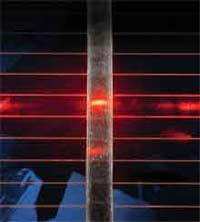An MIT scientist has discovered a way to significantly improve the efficiently of an existing type of silicon solar cell while reducing the cost at the same time. The technology is being commercialized by a startup in Lexington, MA, called 1366 Technologies, which has announced its first round of funding. Venture capitalists invested $12.4 million in the company.
1366 Technologies says that it improves the efficiency of multicrystalline silicon solar cells by 27 percent compared with conventional ones. 1366 Technologies is building a pilot-scale manufacturing plant that will make full-sized solar cells (about 15 centimeters across). Within a year, the company will make a determination whether its pilot-plant results will justify building a factory for commercial production.
Commercial solar cells made from multicrystalline silicon are normally far less efficient than more expensive ones made from single-crystal silicon, but they're cheaper. The 27 percent improvement will bring multicrystalline cells to efficiencies about the same as single-crystal cells--around 19.5 percent--at the lower costs. So, if the technology successfully scales up, Sachs says, it could significantly bring down the cost of solar electricity. Sachs says that today, solar cells cost about $2.10 per watt generated. When manufactured at a commercial scale, the first cells incorporating his new technology will cost $1.65 per watt. Planned improvements will bring down this cost to about $1.30 a watt, he says. To compete with coal, the cost will need to come down to about $1 a watt, something that Sachs predicts can be achieved by 2012 with further improvements in antireflection coatings and other anticipated advances.
1366 Technologies, whos name comes from the solar constant, or the average amount of solar radiation that hits Earth's atmosphere(which is 1366 watts per square meter) plans to manufacture its own cells, Sachs says that it is also open to licensing the technology to other solar-cell makers. Ultimately, Sachs hopes that his technology will speed the adoption of solar power to meet global energy requirements. "We need an exponential growth curve now," he says. "Not 15 years from now--that's too late."

